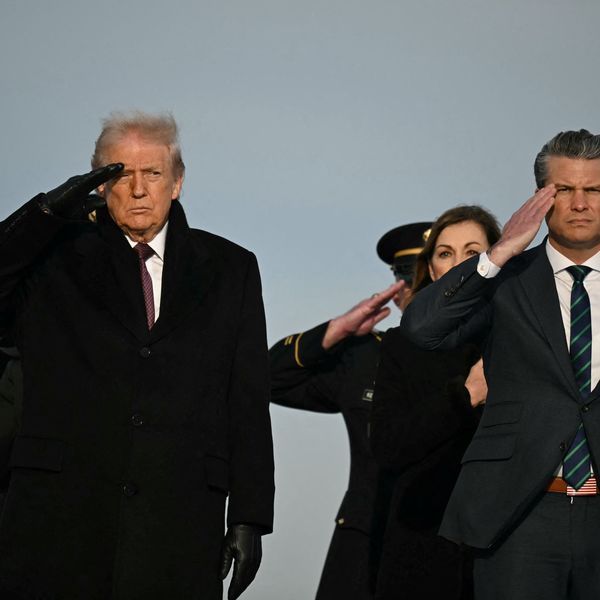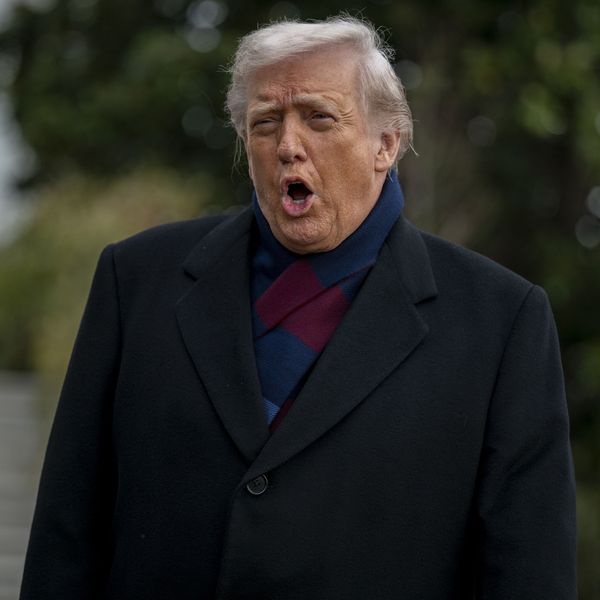Against ISIS in Syria, President Obama's Diplomacy Push Is Crucial
On Sunday night, President Obama addressed the nation on "keeping the American people safe."
Here was President Obama's bullet point on diplomacy:
Fourth, with American leadership, the international community has begun to establish a process -- and timeline -- to pursue ceasefires and a political resolution to the Syrian war. Doing so will allow the Syrian people and every country, including our allies, but also countries like Russia, to focus on the common goal of destroying ISIL -- a group that threatens us all.
The New York Times' main article on the speech did not even mention President Obama's bullet point on diplomacy.
But U.S. diplomacy to end the Syrian civil war is crucial to confronting ISIS.
In late September, UN Secretary General Ban Ki-moon told the UN General Assembly that five countries - the United States, Russia, Saudi Arabia, Turkey and Iran - were key to finding a political solution in Syria.
On November 14, these five countries and others signed an agreement for talks to begin between the Syrian government and opposition representatives on a transition government by New Year's Day. According to the agreement, as soon as the talks on a transition government start, the five countries will support an immediate, UN-monitored ceasefire between everyone in Syria participating in the talks. No such agreement existed before between these five countries.
How do we know that the five countries are taking the agreement seriously? They're arguing vigorously over the details of its implementation. If its details are worth arguing about, then the agreement must matter.
In particular, the five powers must believe that it's likely that there's going to be a ceasefire between the Syrian government and its non-ISIS opposition, because they're arguing about which groups are going to be covered by the ceasefire. And the five powers must believe that the talks on a transition government matter, because they're arguing about which groups are going to be represented at the talks.
If it matters that ISIS holds so much territory in Syria, then the November 14 Vienna agreement matters. If territory is going to be taken away from ISIS, then it has to be occupied by somebody else. The "somebody else" isn't going to be Western ground troops. That would be unsustainable - as President Obama said Sunday night - and Western publics won't support it. Even if Western publics would support it in the beginning, they wouldn't maintain their support when it becomes a quagmire. The "somebody else" has to be local. And for "local" to work, there has to be a diplomatic agreement between the United States, Russia, Saudi Arabia, Turkey, and Iran.
In the absence of a diplomatic agreement, any proposal for "local" to be the present Syrian government is likely to be undermined by Saudi Arabia and Turkey. In the absence of a diplomatic agreement, any proposal for "local" to be people currently fighting to overthrow the Syrian government is likely to be undermined by Russia and Iran. Without a diplomatic agreement, there can be no sustainable significant reduction in the territory controlled in Syria by ISIS. Diplomacy to end the Syrian civil war isn't just a nice idea. It's the only way out.
You can show your support for Secretary Kerry's efforts for a ceasefire and talks on a negotiated transition government in Syria by New Year's Day here.
An Urgent Message From Our Co-Founder
Dear Common Dreams reader, The U.S. is on a fast track to authoritarianism like nothing I've ever seen. Meanwhile, corporate news outlets are utterly capitulating to Trump, twisting their coverage to avoid drawing his ire while lining up to stuff cash in his pockets. That's why I believe that Common Dreams is doing the best and most consequential reporting that we've ever done. Our small but mighty team is a progressive reporting powerhouse, covering the news every day that the corporate media never will. Our mission has always been simple: To inform. To inspire. And to ignite change for the common good. Now here's the key piece that I want all our readers to understand: None of this would be possible without your financial support. That's not just some fundraising cliche. It's the absolute and literal truth. We don't accept corporate advertising and never will. We don't have a paywall because we don't think people should be blocked from critical news based on their ability to pay. Everything we do is funded by the donations of readers like you. Will you donate now to help power the nonprofit, independent reporting of Common Dreams? Thank you for being a vital member of our community. Together, we can keep independent journalism alive when it’s needed most. - Craig Brown, Co-founder |
On Sunday night, President Obama addressed the nation on "keeping the American people safe."
Here was President Obama's bullet point on diplomacy:
Fourth, with American leadership, the international community has begun to establish a process -- and timeline -- to pursue ceasefires and a political resolution to the Syrian war. Doing so will allow the Syrian people and every country, including our allies, but also countries like Russia, to focus on the common goal of destroying ISIL -- a group that threatens us all.
The New York Times' main article on the speech did not even mention President Obama's bullet point on diplomacy.
But U.S. diplomacy to end the Syrian civil war is crucial to confronting ISIS.
In late September, UN Secretary General Ban Ki-moon told the UN General Assembly that five countries - the United States, Russia, Saudi Arabia, Turkey and Iran - were key to finding a political solution in Syria.
On November 14, these five countries and others signed an agreement for talks to begin between the Syrian government and opposition representatives on a transition government by New Year's Day. According to the agreement, as soon as the talks on a transition government start, the five countries will support an immediate, UN-monitored ceasefire between everyone in Syria participating in the talks. No such agreement existed before between these five countries.
How do we know that the five countries are taking the agreement seriously? They're arguing vigorously over the details of its implementation. If its details are worth arguing about, then the agreement must matter.
In particular, the five powers must believe that it's likely that there's going to be a ceasefire between the Syrian government and its non-ISIS opposition, because they're arguing about which groups are going to be covered by the ceasefire. And the five powers must believe that the talks on a transition government matter, because they're arguing about which groups are going to be represented at the talks.
If it matters that ISIS holds so much territory in Syria, then the November 14 Vienna agreement matters. If territory is going to be taken away from ISIS, then it has to be occupied by somebody else. The "somebody else" isn't going to be Western ground troops. That would be unsustainable - as President Obama said Sunday night - and Western publics won't support it. Even if Western publics would support it in the beginning, they wouldn't maintain their support when it becomes a quagmire. The "somebody else" has to be local. And for "local" to work, there has to be a diplomatic agreement between the United States, Russia, Saudi Arabia, Turkey, and Iran.
In the absence of a diplomatic agreement, any proposal for "local" to be the present Syrian government is likely to be undermined by Saudi Arabia and Turkey. In the absence of a diplomatic agreement, any proposal for "local" to be people currently fighting to overthrow the Syrian government is likely to be undermined by Russia and Iran. Without a diplomatic agreement, there can be no sustainable significant reduction in the territory controlled in Syria by ISIS. Diplomacy to end the Syrian civil war isn't just a nice idea. It's the only way out.
You can show your support for Secretary Kerry's efforts for a ceasefire and talks on a negotiated transition government in Syria by New Year's Day here.
On Sunday night, President Obama addressed the nation on "keeping the American people safe."
Here was President Obama's bullet point on diplomacy:
Fourth, with American leadership, the international community has begun to establish a process -- and timeline -- to pursue ceasefires and a political resolution to the Syrian war. Doing so will allow the Syrian people and every country, including our allies, but also countries like Russia, to focus on the common goal of destroying ISIL -- a group that threatens us all.
The New York Times' main article on the speech did not even mention President Obama's bullet point on diplomacy.
But U.S. diplomacy to end the Syrian civil war is crucial to confronting ISIS.
In late September, UN Secretary General Ban Ki-moon told the UN General Assembly that five countries - the United States, Russia, Saudi Arabia, Turkey and Iran - were key to finding a political solution in Syria.
On November 14, these five countries and others signed an agreement for talks to begin between the Syrian government and opposition representatives on a transition government by New Year's Day. According to the agreement, as soon as the talks on a transition government start, the five countries will support an immediate, UN-monitored ceasefire between everyone in Syria participating in the talks. No such agreement existed before between these five countries.
How do we know that the five countries are taking the agreement seriously? They're arguing vigorously over the details of its implementation. If its details are worth arguing about, then the agreement must matter.
In particular, the five powers must believe that it's likely that there's going to be a ceasefire between the Syrian government and its non-ISIS opposition, because they're arguing about which groups are going to be covered by the ceasefire. And the five powers must believe that the talks on a transition government matter, because they're arguing about which groups are going to be represented at the talks.
If it matters that ISIS holds so much territory in Syria, then the November 14 Vienna agreement matters. If territory is going to be taken away from ISIS, then it has to be occupied by somebody else. The "somebody else" isn't going to be Western ground troops. That would be unsustainable - as President Obama said Sunday night - and Western publics won't support it. Even if Western publics would support it in the beginning, they wouldn't maintain their support when it becomes a quagmire. The "somebody else" has to be local. And for "local" to work, there has to be a diplomatic agreement between the United States, Russia, Saudi Arabia, Turkey, and Iran.
In the absence of a diplomatic agreement, any proposal for "local" to be the present Syrian government is likely to be undermined by Saudi Arabia and Turkey. In the absence of a diplomatic agreement, any proposal for "local" to be people currently fighting to overthrow the Syrian government is likely to be undermined by Russia and Iran. Without a diplomatic agreement, there can be no sustainable significant reduction in the territory controlled in Syria by ISIS. Diplomacy to end the Syrian civil war isn't just a nice idea. It's the only way out.
You can show your support for Secretary Kerry's efforts for a ceasefire and talks on a negotiated transition government in Syria by New Year's Day here.

